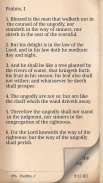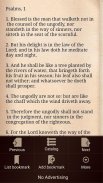




Bible - Psalms

Bible - Psalms açıklaması
Psalms
The Book of Psalms (Hebrew: תְּהִלִּים or תהילים Tehillim meaning "Praises"), commonly referred to simply as Psalms or "the Psalms", is the first book of the Ketuvim ("Writings"), the third section of the Hebrew Bible. The English title is from the Greek translation, ψαλμοί psalmoi, meaning "instrumental music" and, by extension, "the words accompanying the music." There are 150 psalms in the Jewish and Western Christian tradition (more in the Eastern Christian churches), many of them linked to the name of King David, but his authorship is not accepted by most modern Bible scholars.
Benedictions and superscriptions
The Book of Psalms is divided into five sections, each closing with a doxology (i.e., a benediction) – these divisions were probably introduced by the final editors to imitate the five-fold division of the Torah:
Book 1 (Psalms 1–41)
Book 2 (Psalms 42–72)
Book 3 (Psalms 73–89)
Book 4 (Psalms 90–106)
Book 5 (Psalms 107–150)
Many psalms (116 of the 150) have individual superscriptions (titles), ranging from lengthy comments to a single word. Over a third appear to be musical directions, addressed to the "leader" or "choirmaster," including such statements as "with stringed instruments" and "according to lilies." Others appear to be references to types of musical composition, such as "A psalm" and "Song," or directions regarding the occasion for using the psalm ("On the dedication of the temple," "For the memorial offering," etc.). Some carry the names of individuals, the most common being David, and thirteen of these relate explicitly to incidents in the king's life.
Overview
Individual psalms were originally hymns, to be used on various occasions and at various sacred sites; later, some were anthologised, and might have been understood within the various anthologies (e.g., ps.123 as one of the Psalms of Ascent); finally, individual psalms might be understood within the Psalter as a whole, either narrating the life of David or providing instruction like the Torah. In later Jewish and Christian tradition, the psalms have come to be used as prayers, either individual or communal, as traditional expressions of religious feeling.
Mezmurlar
Mezmurlar Kitabı (İbranice: תְּהִלִּים veya תהילים "hamd" anlamına Tehillim), yaygın Mezmurlar veya "Mezmurlar", Ketuvim ilk kitabı ("Yazılar"), İbranice İncil'in üçüncü bölümü basitçe olarak anılacaktır. İngilizce başlığı "enstrümantal müzik" ve uzantısı anlamı Yunanca çevirisi, ψαλμοί psalmoi, dan "kelimeleri birlikte müzik." Orada Yahudi ve Batı Hıristiyan geleneğinde 150 ilahiler (Doğu Hıristiyan kiliseleri daha fazla), Kral Davut'un adını bağlantılı pek çoğu, ancak onun yazarlık en modern İncil bilim adamları tarafından kabul edilmez.
Benedictions ve superscriptions
Mezmurlar Kitabı, beş bölüme ayrılmıştır, her bir doxology (yani, bir kutsama) ile kapanış - bu bölünmeler muhtemelen Tevrat'ın beş kat bölümü taklit nihai editörleri tarafından tanıtıldı:
Kitap 1 (Mezmurlar 1-41)
Kitap 2 (Mezmurlar 42-72)
Kitap 3 (Mezmurlar 73-89)
Kitap 4 (Mezmurlar 90-106)
Kitap 5 (Mezmurlar 107-150)
Birçok ilahiler (150 116) uzun yorumlardan bir tek kelime arasında değişen, bireysel superscriptions (başlık) var. Üçüncü bir müzikal yön olarak görünür üzerinde, örneğin "telli çalgılar ile" gibi ifadeleri de dahil olmak üzere ", koro yönetmeni" "lider" ya hitaben "zambaklar göre." Diğerleri gibi "tapınağın ithaf üzerine," "A ilahi" ve "Song" veya psalmı kullanmak için fırsat ilişkin yönlerde ("anıt arz için," vb gibi müzikal kompozisyon türleri için başvurular, gibi görünen .) Bazı kişilerin adlarını, en yaygın David olmak ve bu on üç kralın hayatında olaylara açıkça ilgilidir taşır.
Genel bakış
Bireysel ilahiler çeşitli vesilelerle ve çeşitli kutsal sitelerinde kullanılmak üzere başlangıçta ilahileri, vardı; Daha sonra, bazı anthologised edildi ve çeşitli antoloji (örneğin, ps.123 Ascent Zebur biri olarak) kapsamında anlaşılması olabilir; Sonunda, bireysel ilahiler Davut hayatını anlatan veya Tevrat gibi eğitim veren, ya bir bütün olarak zebur içinde anlaşılmış olabilir. Daha sonra Yahudi ve Hıristiyan geleneğinde, ilahiler, dini duygu geleneksel ifadeleri olarak, bireysel ya da toplumsal ya dualar, olarak kullanılmak üzere gelmiş.

























